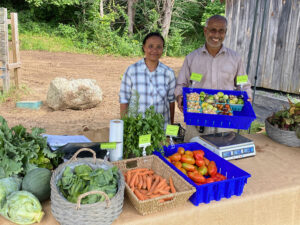Mohammed Hannan grew up on a family farm, but it was thousands of miles away and very different from where he now works the land in Lincoln.
A lot has changed for Hannan, 46, since his days as a boy in rural Bangladesh and as a college student earning a degree in wildlife and conservation biology from the University of Chittagong. He came to America in 2008 on a fellowship from Duke University and now works full-time as a research scientist at Harvard Medical School. But it was food that drove him back toward agriculture.
“Right after coming here, I honestly didn’t have enough money, so I was buying food from Market Basket, Haymarket, and so forth. I quickly realized I needed access to good food but I didn’t have the money for Whole Foods,” he said. He thought of growing food himself but wasn’t sure how to make that happen while working full-time, but he volunteered on a farm on weekends one summer, “and after that I realized it was a lot of fun as well as hard work.”
Hannan learned the ins and outs of New England farming with the help of the New Entry Sustainable Farming Project. He graduated in 2020 from the program, whose mission is to improve local and regional food systems by training the next generation of farmers to produce food that is sustainable and nutritious, and making this food accessible to everyone. While he was learning to farm in Beverly, he won fifth place in an agricultural contest in the “heaviest tomato” category with a Yellow Brandywine weighing in at just over two pounds.
Now Hannan commutes from his home in Cambridge to manage his crops in Lincoln, where he’s been growing vegetables on the Ricci conservation land off Route 2A since 2018. On Saturdays, he and his wife Kaniz also run a farm stand on Route 117 (the Umbrello hay field, site of the former Blue Heron Farm). During his journey, he’s benefited from an ongoing Lincoln connection — New Entry director Jennifer Hashley also helps run Codman Community Farms with her husband Pete Lowy and continues to advise him.
Hannan Agro Farms has also gotten help through a CSA work-share program and WWOOFers—visitors from the Worldwide Opportunities on Organic Farms program who help out in exchange for produce and learning about organic agriculture.
During its successful first year, the farm has grown array of traditional veggies and some not-so-familiar produce. These include luffa gourds, which Hannan used to eat in curries back in Bangladesh (the plant can also be dried and used as a sponge). In the future he hopes to include more East Asian gourds and melons, amaranth, and perhaps basil from Ghana. “I’m trying to incorporate quite a bit of stuff from back home and a few other countries,” he said.
Hannan leases both plots of land from the town, which has been very helpful in helping him get started and providing a potable water source on the Umbrello plot, where he brings each week’s load of produce, washes and refrigerates it before arraying it on the tables for sale. He also sells through New Entry’s Food Hub.
Next year, Hannan hopes to use some of the Umbrello land for gourd tunnels — open-ended structures in which the plants grow vertically and the emerging gourds hang upside-down. Salad greens and early-season microgreens are also on his wish list.
“At this point I’m expanding the operation very slowly, taking the time to do this experiment and see where I can take it — see if I can make a living at it,” he said. “To me, I think it’s really, really important that we know our farms and where our food is coming from. During this pandemic, we learned a hard lesson about how the food supply chain can be broken easily. Convenience always comes with a cost. We have our PCP, and we should also have a food care provider — the local farmer.”
Juggling a farm, a full-time job, and a family is rewarding if not always easy. “I believe that whatever you do, if you make a living from what you really like and you have the power of helping other people, it’s really refreshing,” Hannan said.
The Hannan Agro Farms farmstand in the Umbrello hay field opposite 275 South Great Rd. is open on Saturdays from 11 a.m –6 p.m. until late October.

Leave a Reply